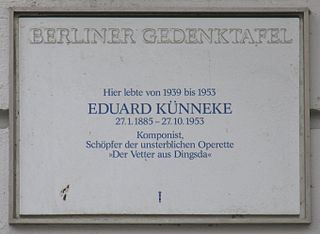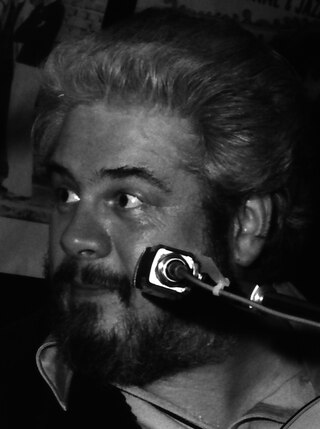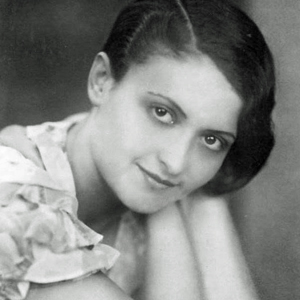Related Research Articles

Franz Lehár was an Austro-Hungarian composer. He is mainly known for his operettas, of which the most successful and best known is The Merry Widow.

The Land of Smiles is a 1929 romantic operetta in three acts by Franz Lehár. The German language libretto was by Ludwig Herzer and Fritz Löhner-Beda. The performance duration is about 100 minutes.

Der Zigeunerprimas is a three-act operetta, which was composed by Emmerich Kálmán. The libretto was written by Julius Wilhelm and Fritz Grünbaum. It premiered at the Johann Strauß Theatre in Vienna on 11 October 1912.

Eduard Künneke was a German composer notable for his operettas, operas, theatre music and some orchestral works.

Robert Elisabeth Stolz was an Austrian songwriter and conductor as well as a composer of operettas and film music.

Alfred Maria Willner was an Austrian writer, philosopher, musicologist, composer and librettist.
Fritz Löhner-Beda, born Bedřich Löwy, was an Austrian librettist, lyricist and writer. Once nearly forgotten, many of his songs and tunes remain popular today. He was murdered in Auschwitz III Monowitz concentration camp.
Nico Dostal was an Austrian composer who later specialised in operetta and film music.
Franz Fehringer was a German operatic tenor, particularly associated with light lyric roles in the German, Italian, and French repertories.

William McCreery Ramsey was an American-German jazz and pop singer, journalist and actor famous for his German-language hits. He returned to Germany a year after he had served compulsory military service with the U.S. Air Force there. Active as a singer of jazz and pop already as a soldier, he made a career in different fields of musical entertainment. He sang and recorded German schlager, also German-language cover versions of English hits, jazz and swing. He appeared in films and television series, and ran popular series on radio and television as presenter.
Schwarzwaldmädel is a 1917 operetta in three acts by German composer Leon Jessel. The libretto is by August Neidhart, and the operetta premiered on 25 August 1917 at the old Komische Oper Berlin. It is the most popular operetta written in Germany.

Irene Eisinger was a German and British opera singer and film actress. Her career was closely linked to the foundation and the early years of the Glyndebourne Festival Opera.
Die ungarische Hochzeit is a 1939 operetta by Nico Dostal to a libretto by Hermann Hermecke. It was premiered 4 February 1939 in Stuttgart.
Benno Paul Kusche was a German operatic baritone, who was praised as one of the best Mozart and Wagner singers, especially in character roles and opera buffa.

Ferry Gruber was an Austrian-German tenor in opera and operetta. A member of both the Bavarian State Opera and Staatstheater am Gärtnerplatz in Munich for half a century, he focused on roles of the buffo genre and operetta. He made recordings, appeared on radio and television, performed internationally at major opera houses and festivals, and worked also as an operetta director and a private voice teacher. He was a favourite with the audience, and received the title Kammersänger.
Dorothea Chryst, also Dorli-Maria Chryst is a German operatic and operetta soprano.
Rosl Schwaiger was an Austrian operatic coloratura soprano. She was a member of the Vienna State Opera and the Bayerische Staatsoper, known for singing Mozart roles such as Blonde, Susanna and Zerlina. She appeared at European opera houses and festivals and was especially popular at the Salzburg Festival, where she appeared for decades in opera and sacred concerts.
Peter Minich was an Austrian stage actor who became a tenor performing in operas, operettas and musical films. He was for decades the lead tenor of the Volksoper in Vienna, focused on Viennese operetta.
Hermann Wiedemann was a German operatic baritone and academic teacher. He was a long-term member of the Imperial Court Opera in Vienna from 1916, where he appeared as Faninal in Der Rosenkavalier by Richard Strauss 196 times, and as Beckmesser in Wagner's Die Meistersinger von Nürnberg 155 times. He was Beckmesser also in a recording from the Salzburg Festival 1937, conducted by Arturo Toscanini. He performed internationally at leading opera houses and festivals, such as the Teatro Colón of Buenos Aires and the Zoppoter Festspiele. He appeared in the world premieres of Wolf-Ferrari's I gioielli della Madonna in Berlin, Busoni's Die Brautwahl in Hamburg, and Lehár's Giuditta in Vienna.

Marjon Lambriks is a Dutch soprano who made an international career, especially in Austria. Her focus became operetta, whether performed on stage, for the radio, or in recordings. She recorded the role of Annina in Verdi's La traviata alongside Joan Sutherland and Luciano Pavarotti.
References
- ↑ Lehars "Lustige Witwe" wird 100 ORF.at
- ↑ "Deutsches Rundfunkarchiv, p. 27" (PDF). Archived from the original (PDF) on 2011-09-21. Retrieved 2020-12-06.
- ↑ "Karl Grell: Meeting with Robert Stolz" (PDF). Archived from the original on 2014-08-12. Retrieved 2020-01-16.
{{cite web}}: CS1 maint: bot: original URL status unknown (link) Google Books (excerpts)